How To Play Magic: The Gathering On Steam: A Review Of Duels Of The Planeswalkers
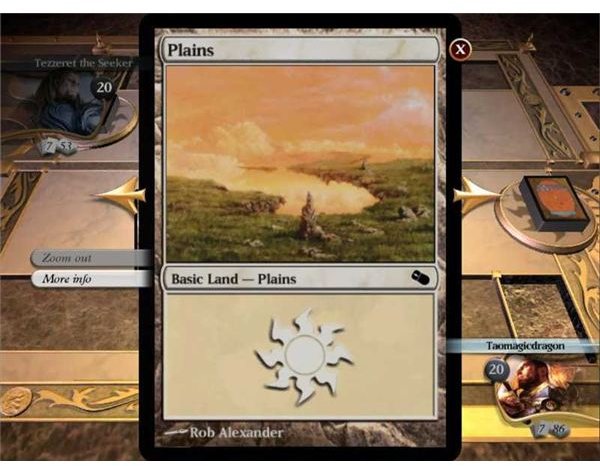
Getting Started
Hi and thank you for reading the first of hopefully many articles here on Bright Hub! Duels of the Planeswalkers made its debut as a Steam game back in June and with its second expansion right around the corner, it seems a perfect time to take a close look at this game. Duels of the Planeswalkers is based greatly on the trading card game Magic: the Gathering. Not sure how to play Magic: the Gathering? Not a problem! The game displays helpful tips on how to play which card at which time and has a difficulty setting that you can change on the fly to progress instead of the standard practice of having to start the game at one setting and needing to start over if you switch to another. The basic way to play is you first draw seven cards for your opening hand, you draw a card at each turn, and you use your turns to play a land card (1 per turn) that provides mana for the spells you can cast. These spells include powerful creatures, sorcery that helps you or harms your opponent, and even artifacts brimming with untapped potential. Whenever you want to take a closer look at a card in your hand, simply use your house wheel or right-click and select Zoom In and you’ll see a magnified view of the card and a side menu that has an option called More Info. This will tell you exactly what kind of card it is, how to play it, and explains the different aspects of each card.
Accessing the More Info Menu
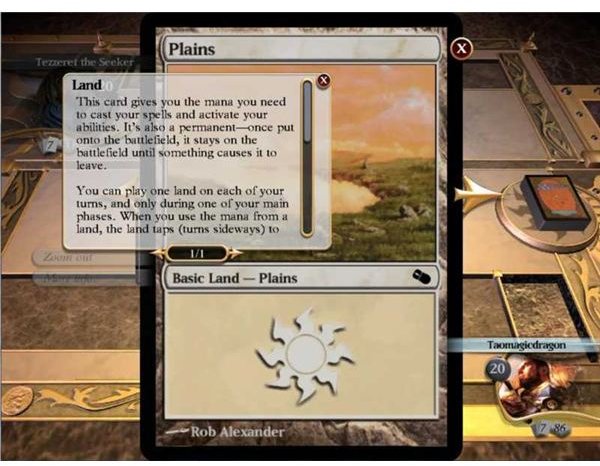
Campaign Mode
Now that we know a bit more on how to play Magic: the Gathering, let’s talk about the point of the game. Duels of the Planeswalkers’ single-player campaign (and co-op campaign with a friend via internet) consists of a gauntlet-inspired set-up where you need to defeat other Planewalkers (anyone who plays Magic is a Planewalker) for some purpose that is never explained. This part was a bit of a let-down, not even a flimsy plot of some tournament you need to enter for no other reason than to be the best which means little immersion that’s okay for a casual game but means there’s little personal satisfaction and no real sense of accomplishing anything when you’ve finished. Lack of a plot aside, whenever you beat a Planeswalker, you unlock another card for your deck and each deck has 18-20 cards that you can unlock. These are usually high-powered cards or cards that help your deck function better. You start off with two decks but can unlock more as the game progresses by beating that deck’s Planeswalker. The Planeswalkers themselves are based off of the selection of Planeswalker cards in Magic so favourites like Elspeth Tirel, Nicol Bolas, Jace Beleren, and Chandra Nalaar are your opponents and their decks tend to highlight their personalities though there’s no pre-battle speech nor any interaction with them beyond the duel. The other problem is there’s no Deck Construction beyond adding or taking away the cards you unlock which means many weaker cards in the deck are there forever and whenever you add a card, a number of Land cards are added automatically which makes it that much harder to draw that good card that’ll win you the game.
Custom Duel Mode
The game’s Custom Duel feature allows you to battle any opponent and allows you pick the rules like how much life either player has, the number of cards in their hand, etc. The downside is winning doesn’t unlock any cards in your deck nor does it allow you to unlock new decks so other than stacking things in your favour (or giving yourself a challenge), there seemed to be little point in playing this over the campaign. This doesn’t mean it’s a horrible addition, just that it felt a bit redundant unless you have no interest in the campaign. There’s a Co-Op Mode that, via Internet, you and a friend can do Custom Duels against some Planewalkers which is more enjoyable, but still feels the same as solo-mode in that it doesn’t help you obtain new cards or decks.
Challenge Mode
My favourite part of the game, Challenge Mode is a series of puzzles where you’re given a certain scenario between you and an opponent where you must win in that turn (or do something in that turn that makes your opponent lose on their following turn). These range from combat-finagling to using your creature effects in ways you wouldn’t normally think to use them. I found it to be the best addition to the game and very fulfilling for both puzzlers and Magic: the Gathering players though I acknowledge that if you don’t play Magic, you may just find these frustrating. My one complaint about this is that there’s certain ways to win that the computer doesn’t recognize so even though you would normally win, it still says you lose. This isn’t necessarily a slight on the game so much as it is a compliment that players can engineer ways to deal with certain scenarios that even the developers didn’t see coming (okay, it is a slight against their testers which, if they were worth their salt, would’ve caught). Luckily, the ways to beat the challenges are posted everywhere, including the official Magic website, so if your way isn’t recognized, you can look up how to do it secure in the knowledge that you’re not admitting defeat or being “cheap for using cheats”.
Beating the First Challenge
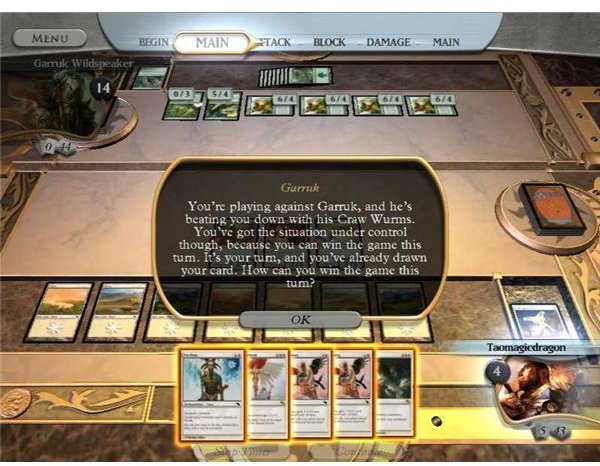
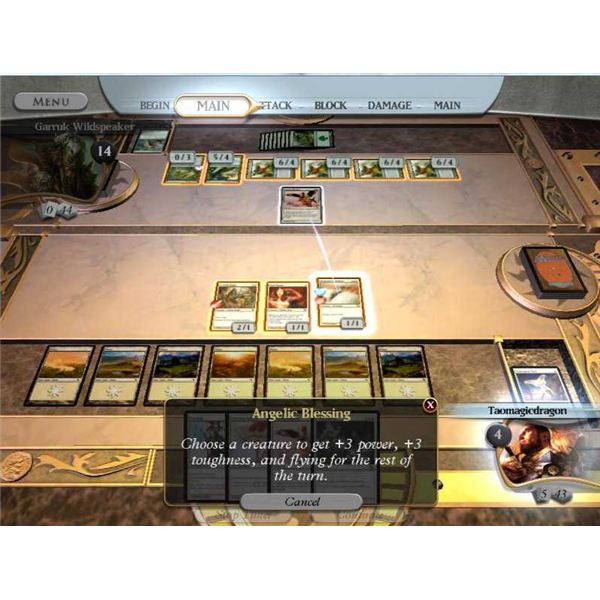
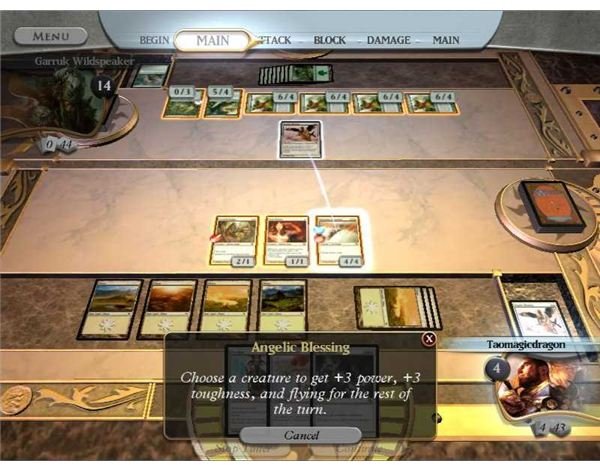
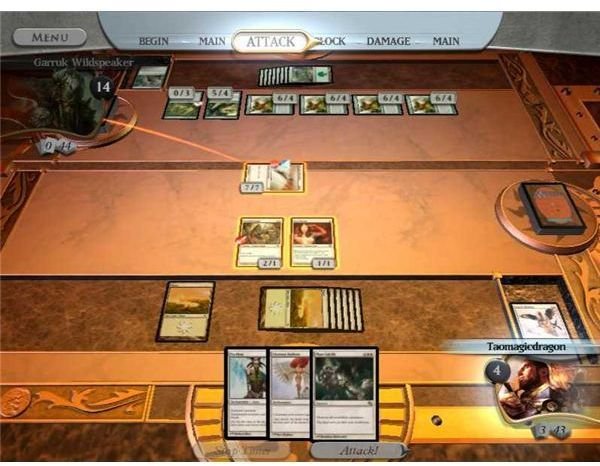
Multi-player
In my personal opinion, a game’s multi-player should never be the foundation of a game. If the game’s mechanics are abysmal, using those mechanics with multiple people won’t make the game better and the reverse is true. Many games, especially computer games, use multi-player and its ease or tedium of use can be a selling point, but if the game is bad then the speed of the servers of which their played doesn’t change that fact. Duels of the Planewalkers’ multi-player is different from its single-player modes because the AI can only do so many things whereas another player can offer more of a challenge and do things the AI simply can’t. The lack of ingame mic controls is a bit annoying, but the game is generally balanced because each deck has counters to each other deck and the lack of customization (will get to in a minute) does mean that every deck is balanced and no broken decks have really emerged (though Nissa Revane’s deck, Ears of the Elves, is considered one of the best).Overall, Multi-player is fun, but doesn’t add (or take away) anything from the way the game is played.
Achievements
There are many exclusive Steam achievements that cannot be accessed by playing stream games with no internet access. These are earned by accomplishing certain feats and goals in the game’s Campaign, Challenge, and Multi-Player modes. They add a purpose to the game that the storyline and clear-cut goals don’t and you feel a sense of accomplishment for achieving a perfect 100% for game completion.
Achievements List
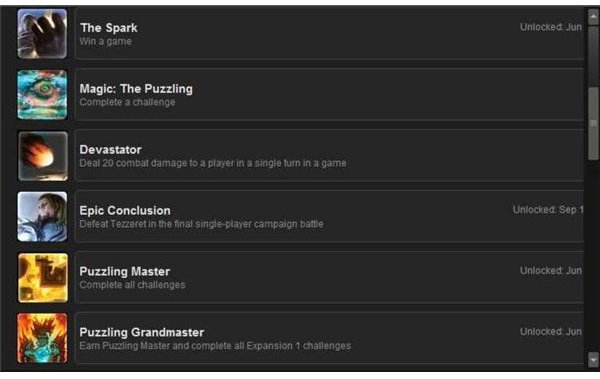
Technical Aspects
The game is pretty solid. Ran quickly on my machines and is not graphically intensive. Instead of adding in a myriad of effects, they chose to simply recreate the card, the table, the gameplay and kept it true to the card game. If you’re expecting Yu-Gi-Oh! with 3-D recreations of beasts then you may be disappointed but, for the rest of us, it gives a realistic look at how the game is played; not a romanticized, overdone production that’s obviously fake. The other neat aspect is the ability to unlock cards, decks, and can even make your decks full of holographic cards for a small monetary fee. It may seem wasteful, but for people who only want to play multi-player, this can expedite the process and still cost less than trying to copy the deck with real cards or even buy a traditional console/pc game at retail price (buying the game and both expansion packs with all decks unlocked costs less than 30$).
Downloadable Content Menu
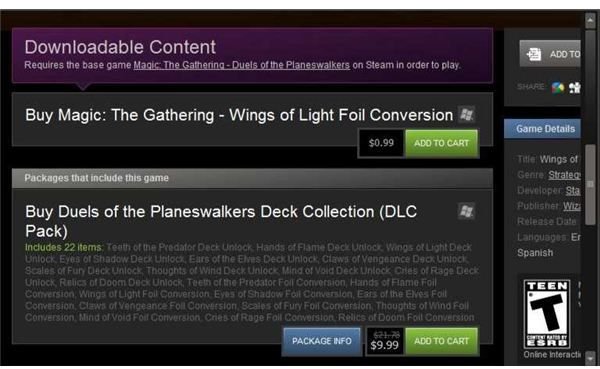
Final Thoughts
The game is a faithful reiteration of Magic: the Gathering and its pros include solid gameplay, ease of changing difficulty on the fly, and the challenges are fun and require some thought. The cons include lack of Deck Construction beyond adding/taking away the cards you unlock and that not all interactions were accounted for in the challenges. You may be asking, “Can I play Steam Games with no internet access?” The answer is you can, but Steam Achievements and game progress will not be saved, so be wary of that. The cost of the game, 10$ (5$ per expansion), is fair for what you get, and is far cheaper than buying a bunch of cards and then figuring out you don’t like Magic. If you take it for what it is, the game is great. If you’re expecting the depth and customization of Magic: the Gathering Online or the actual card game itself, then this isn’t the game for you.
Rating (3 out of 5)
I give this game a rating of 3/5 with the lack of deck construction and the bug-like problems with challenges being minor concerns while the big killer, for me, being the lack of any storyline or plot despite having a lot of potential in using Planeswalkers which have books devoted to them yet appear to have as much depth to them as the cards they’re printed on.. A game can have amazingly rendered graphics, faithful application of mechanics, and still fall flat if it has no story to back it up. A player needs a reason for playing that draws them into the story to provide immersion and enjoyment in seeing themselves succeed. That aside, it’s a game worth its price tag, focuses on gameplay without worrying about being graphically intensive, and was the challenges and achievements allowed for a dozen hours of gameplay.
